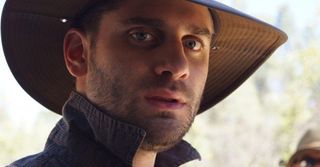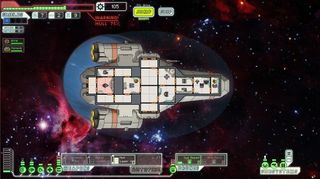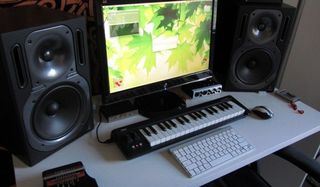The music of FTL: Faster Than Light - an interview with composer Ben Prunty

It goes blip and bloop and ding-ing-ing with reverberating voices, wrapping hazy nebulae and fierce space battles with warm melodies that sing "Oh my God, we're in spaaaaaace!" It's the soundtrack to indie sleeper hit FTL: Faster Than Light, and it's some of the finest game music of 2012.
The 29-track album ( $5 on Bandcamp ), composed by San Francisco Bay Area-based musician Ben Prunty , combines existing sci-fi motifs such as lonely, echoing synth bells with a unique space adventure sound. Tracks like MilkyWay and Civil are a skirmish between eerie tension and soothing, stargazing melodies, and their sparse chord progressions, warm synth melodies, and chiptunes-like blips have been stuck between my ears since they became my spaceship command companions last year.
In between are ambient tracks, such as Cosmos (Explore), which are harder to separate from the game, but flood their sectors with danger and mystery. Its sibling (each track has a Battle variant), on the other hand, builds to one of my favorite themes in the soundtrack.
FTL is Prunty's first major success as a game music composer, but he's been making music for 10 years and has another album, Chromatic T-Rex, available for the price you name on Bandcamp . What luck: when I got in touch with Prunty, we discovered that he's just a short drive from our South San Francisco office, and he offered to come by for an interview about FTL, his music, and his career.
PC Gamer: So you said you're from Maine. Why did you move to the Bay Area?
Ben Prunty: Because I wanted to work for games. I wanted to do music for games. After I graduated from college—I had a degree in audio engineering—I knew that I wasn't gonna get any jobs in music for games in Maine. There's not really any game industry presence there. It'd be kinda cool if there was, but, yeah, I had to move...and then I kinda got distracted and worked at Google for a couple years.
"...I kinda got distracted and worked at Google for a couple years."
What did you do at Google?
PC Gamer Newsletter
Sign up to get the best content of the week, and great gaming deals, as picked by the editors.
I fixed computer hardware in data centers, so I'd figure out what was wrong with a computer and then rip it apart. It was pretty fun.
So you've got a few fields of expertise?
Sort of, yeah, I didn't know anything when I—I just had a friend who worked there and this was in the old days when Google would just hire you because they liked you, and not necessarily because of your skills. I didn't know anything about computers but I started there and they taught me a ton. I learned all about Linux and discovered that I hated Linux. [Laughs]
Yeah, I was there for a couple of years and then I realized that I needed to get back to doing music.
So, what do you do now? Is it music full time?
Actually, in November I quit my last day job and I'm doing music full time. The sales of FTL are good enough to support me...FTL is a big success and I kept the rights to the music, so whenever the soundtrack sells on Steam or Bandcamp that money goes to me.
So you do the soundtrack and keep the rights—get the money from soundtrack sales—but not royalties when the game is sold, right?
Right, I don't get royalties from the game. I was paid upfront. I was working for the promise of money for a while, and then the Kickstarter thing exploded. Justin and Matt, the two FTL guys, they asked for $10,000 and they got $200,000. So, they came to me and were like, “We want to pay you what you're worth, so let's talk about that.”
So they paid me up front. I negotiated with them and asked them, “Hey, maybe we can do a revenue share or something,” but they didn't want to do that, so I asked instead to keep the rights so I could sell the music myself, and they agreed to that. So yeah, it worked out.

Before you started working on FTL, did you go to them and say, “Here's what I can do,” or did they seek you out?
So, at Google I made a friend who I still hang out with a lot, he's a really good friend. His name's Anton Mikhailov. He developed the PlayStation Move controller.
We were coworkers at Google—we both ripped apart computers together and it was really fun—and he knew that I was doing music and looking for work, and he would always help me out by finding people who were making games, and he knew Matt Davis, the programmer for FTL. They both went to Berkeley together. So, one day Anton came over with a USB stick and said, “Hey, my friend is making this game, wanna check it out? He needs music.”
"I was definitely not musically inclined. I played trumpet in band and I was awful."
So we started playing FTL and it was awesome. They already had a nearly complete—not a complete game, but it was a fully functional game. And it was super fun, so I was like, “Yes, I want to be part of this.”
So, moving along to the music: When did you start? Were you always musically inclined?
I was definitely not musically inclined. I played trumpet in band and I was awful.
I played the tuba in school and I was terrible.
Well, I can tell you that being bad in music class doesn't necessarily you're going to suck at music in general. I had no musical talent. All I had was the thought that making music with computers would be really, really cool, and I wanted to do that. [Laughs]
Well, you're right. It's really cool.
Yeah, I was like, “Wow, this would be really awesome!” I had no understanding of music and I spent a long time making really terrible music. It was decently produced because I was an audio engineering major, but it sounded awful because I couldn't write music. Eventually, I put in the time to learn music theory and learn piano, and then my music suddenly got pretty good—or, at least, not terrible.

There are some fundamentals that I've struggled with music theory, scales, why we use the notes we do—
...Yeah, it's really abstract, and I read a ton of music theory books and most were gibberish. And then I found—you know, at this point after reading several of them, I did get some understanding of music theory and my music was starting to improve—but the best one I found was The Complete Idiot's Guide to Music Theory. The guy who wrote it was amazing. He was able to explain it in this purely, wonderfully functional and logical way. It made more sense.
It's a little embarrassing, I guess, but sometimes those books can be great. It's how I learned to play the harmonica.
Yeah, they can be fantastic books. Some of the best resources you can get are the Idiot's Guides or the For Dummies books or whatever. They're amazing.
"I'm profoundly lazy, so, yeah, it's really hard."
And playing the piano is kind of a standard learning method, like you mentioned. Is it something you work on or is it just a tool to help compose?
I actually don't play piano that much anymore. Yeah, it's definitely just a method for me to understand music better. Right now, I've just been focusing on banjo. I play about an hour a day at least. I love banjo.
Banjos are amazing.
I'm a huge fan. I got a banjo when I was in college and I just didn't have enough self-discipline to play it constantly, so I never got past the beginner level. You know, I could play chords and do a bunch of different picking styles, but the last, I don't know, five or six months, I've been trying to plow through it and get better.
Self-discipline. It's hard.
I'm profoundly lazy, so, yeah, it's really hard.
But when you do get the motivation to work, do you have this idea for a song in your head, and then you sit down and make it real? Or is it more something that evolves as you work?
It's a little of both. Often times I'll have an idea for a direction for some kind of sound, or even just a bass line I want to build off, but it often ends up going in completely different ways than I intended. So yeah, it's both. I have an idea, but it's just a jumping off point for a song that'll go nuts.
A particular track is Cosmos. So there's Cosmos Explore and Cosmos Battle in FTL, and they're completely different. They sound nothing like each other even though everything else sort of sounds similar, with the two versions of exploration and battle music...
There's a shared theme.
Yeah, but these are completely different. Cosmos Battle was like—I had no idea where it was going at the time I was writing it. It was surprising me as I was doing it and it was really fun.
On the next page: more music and the rest of the interview...

Tyler grew up in Silicon Valley during the '80s and '90s, playing games like Zork and Arkanoid on early PCs. He was later captivated by Myst, SimCity, Civilization, Command & Conquer, all the shooters they call "boomer shooters" now, and PS1 classic Bushido Blade (that's right: he had Bleem!). Tyler joined PC Gamer in 2011, and today he's focused on the site's news coverage. His hobbies include amateur boxing and adding to his 1,200-plus hours in Rocket League.
Most Popular





